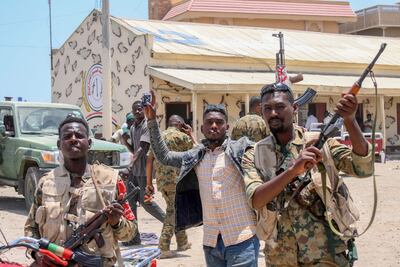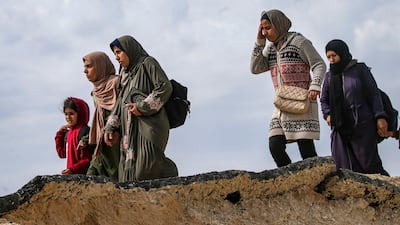Live updates: Follow the latest news on Israel-Gaza
Gazan and Sudanese women, whose home regions are in the grip of two bloody wars, met at Cairo’s journalists’ syndicate on Tuesday to share harrowing stories of their evacuation to Egypt.
While the two conflicts differ greatly in scale, political scope and the difficulty of evacuations, both have resulted in tens of thousands deaths and injuries and the displacement of millions.
Since its start in April last year, the civil war in Sudan, fought between the country’s armed forces and a coalition of rebel militias known as the Rapid Support Forces (RSF), has resulted in the displacement of 1.1 million people to neighbouring countries, 450,000 of whom went to Egypt, according to UNHCR data.
By contrast, the number of Gazans who have been allowed to evacuate to Egypt since October 7, when Israel launched an unprecedented assault on the enclave that has now claimed the lives of more than 32,00 people, is a small fraction of that.
Around 27,000 dual passport holders, helped by foreign governments, have been allowed to leave the Gaza Strip through Egypt since October 7, according to a February report from the Egyptian foreign ministry.
“The vast majority of Gazans remain trapped inside the strip and have not been allowed to leave. This is because this is not a war for land or power. This is an ethnically motivated extermination whose purpose is to end Palestinians,” said Gazan journalist Seba Ismail. Most of her family remain in Gaza.
“What we ask the Egyptian government and people is to open the Rafah crossing and allow people to leave.”
The war in Sudan, which contains ethnic aspects, is predominantly a conflict over control of the country’s rule and resources, and thus far the population has been treated as either an obstacle to one side gaining control over strategic locations or as a source of booty for looting militiamen.

“I saw photos of my house for the first time the day before yesterday. I cannot describe how bad it felt to see it abandoned,” recounted Fahima Hashem, a prominent Sudanese human rights activist whose family evacuated to Egypt last year. “The structure itself was fine, only the main hall had been burnt. But everything inside it was gone, stolen. All they left were my bookshelves and the books on them were untouched.”
Ms Hashem, like most other Sudanese who have been able to leave the country since the war began, belongs to Sudan’s more affluent classes and could therefore afford the travel costs and legally relocate to Egypt.
However, whether they relocate to neighbouring countries legally or not, the travel costs are always high.
Since the war began, six million Sudanese who can't afford to leave the country have been internally displaced, most of them forced to relocate every few days depending on where the fighting is happening, according to Ms Hashem.
In addition to hunger, exhaustion and a total lack of healthcare services, internally displaced Sudanese have to suffer abuses from soldiers on both sides of the war, according to a testimony from a nurse who fled south Darfur last month and relocated to Egypt.
“For three hours, I was part of a group of hundreds that walked through the Nile river to avoid battalions of soldiers stationed on the roads. It was mayhem, the elderly women were falling in the water and had to be carried,” the nurse, who was not identified, recounted in a pre-taped video testimony that was replayed on Tuesday.
“What made it all the more humiliating was the constant verbal abuse we received from the soldiers. We ran into soldiers from both armies on our way to Egypt and they would threaten us and interrogate us with the most infuriating questions. Neither side cares about the people. They just want to win and rule what's left.”
The nurse recounted that hospitals in Darfur had all but stopped functioning amid medicine shortages that resulted in many deaths on her watch.
Cases of rape and miscarriage had also risen dramatically during her last month in Sudan, she said.
Ethnically-motivated rape of members of Darfur’s Masalit ethnic minority by the RSF’s Arab militiamen is rampant, according to Human Rights Watch.

“The real number of rapes is far higher than the 450 or so being reported by some rights organisations. Firstly, we have to consider the fact that media coverage of the war in Sudan is very small and there are areas of the whole country which are entirely cut off from all communications,” explained Shaimaa Taj El Serr, a Sudanese lawyer who also gave testimony on Tuesday.
“That, coupled with the fact that being raped is a shame of the highest order for Sudanese women and many will not report it if they can avoid it.”
Media coverage is a key area of difference between both wars, and while the Gaza war has taken centre stage on international news channels, “there was no real coverage of the Sudan war during its first six months, until the world’s eye was brought to the region by what happened in Gaza”, according to Ms Hashem.
Eyes on Gaza
The extensive coverage of Gaza, which has enabled the world to watch one of the worst conflicts in living memory in real time, was largely facilitated by the enclave’s relatively small surface area (365 square kilometres), according to Fatima Ashour, a Gazan human rights lawyer.
She arrived in Egypt at the end of January after “seeing my entire neighbourhood turned into piles of rubble”.
“I believe Palestine’s case has drawn so much attention in the media because it involves complex abuses by multiple parties.
“Firstly, there is the Zionist Occupation’s aggression, then there is abuse from Palestinian authorities, like Hamas, on the lives of civilians.
“Not to mention the Egyptian government and the western world, which have played a major role in keeping a 14-year blockade of Gaza ongoing,” said Ms Ashour.
The fact that the Sudan war is spread out across the country’s 1.8 million-square-kilometre area has made documenting it next to impossible, said Ms Hashem.
“It is too dangerous for local journalists to travel to provide real coverage of the war.
“And I don’t think international news organisations will risk their correspondents’ lives to cover such a large war, especially when its importance to the West is not so great,” she continued.
Though everyone who spoke on Tuesday was grateful to have escaped war, their relocation has also brought unique pain of its own, in addition to waves of survivor's guilt.
“We love Egypt and always have, but we Sudanese are not used to living in such tight quarters,” said Ms Hashem.
“Our homes are always larger, more open, with front yards for the children to play, so having to live in a tighter, urban setting has been a reminder of what we lost.”
Ms Ashour said what she misses most about Gaza is the view of the Mediterranean Sea, her favourite buildings and the Gazan food.
“When I left, I could not take anything with me, there was no time. So I bought a bottle of pickled red peppers, a Gazan speciality.
“I have it with me here in Egypt as a reminder of what the war has taken away. That’s perhaps the most painful part for me.
“This war wasn’t just waged on our bodies, but also our memories. The occupation destroyed the city we loved and cherished so we can’t remember it.
“There is nothing left, just piles of rubble. And Gaza was so beautiful. Anyone who has been there can tell you that.”


